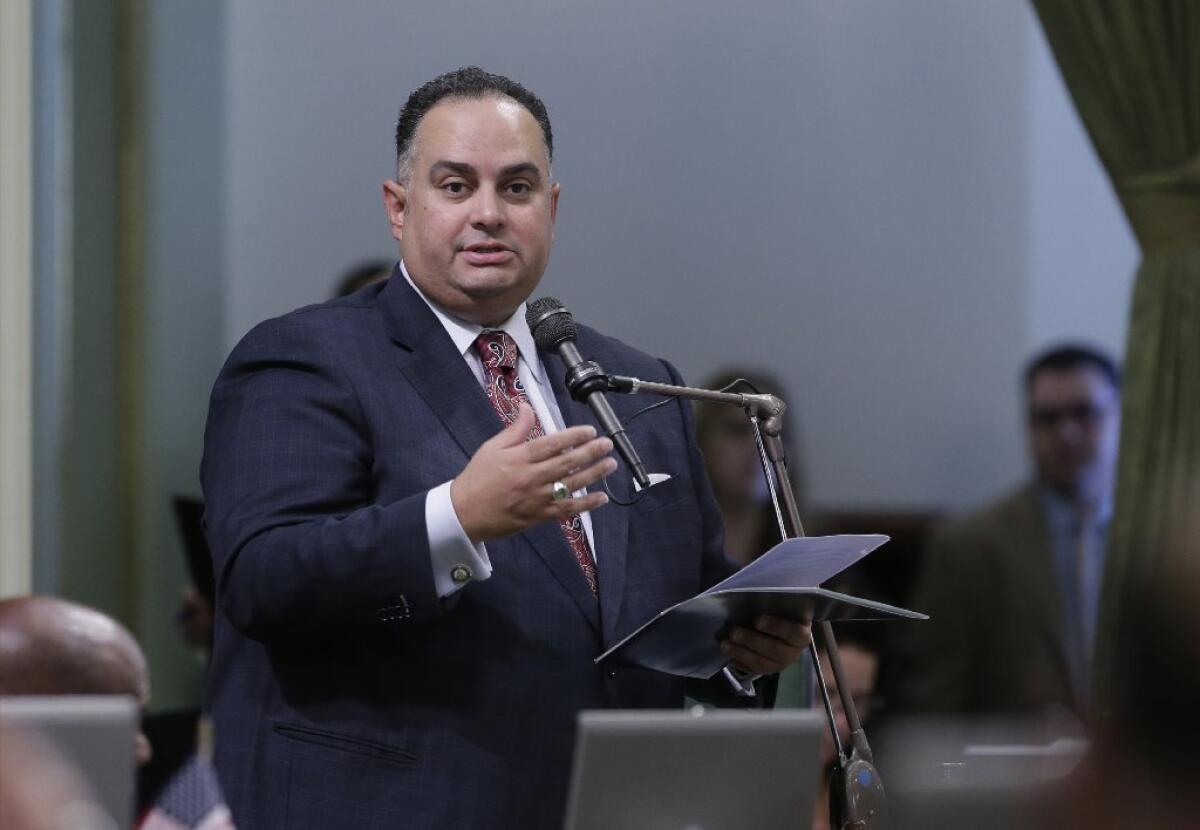Column: As Assembly speaker, he helped tame the budget. What’s next for John Pérez?

- Share via
John A. Pérez became speaker of the Assembly, arguably the second-most powerful position in California, on March 1, 2010. When he took the oath, the state faced the highest unemployment rate in its recorded history and a budget shortfall of $60 billion. The California Department of Finance, not known for hysteria, called it the “worst budget crisis in the state’s history.”
When Pérez left the speakership this month, unemployment was lower than it has been since the onslaught of the Bush-era national recession. And legislators, who once battled to save programs from cuts, now are arguing over how to spend the budget surplus.
The remarkable turnaround is by no means all or even mostly Pérez’s work, nor is it complete. Public employee pension obligations haunt the future of California’s prosperity, and the whipsawing of recent years hardly encourages confidence in the state’s stability. Nevertheless, only curmudgeons and ideologues can deny that California has regained its footing. And Pérez deserves a large dollop of the credit.
------------
FOR THE RECORD:
Villaraigosa: Jim Newton’s May 26 column about John Perez said Antonio Villaraigosa became mayor in 2001. He became mayor in 2005. —
------------
Working with two very different governors — Republican Arnold Schwarzenegger and Democrat Jerry Brown — he has pressed to protect and create jobs, to revamp the budget process and to focus on economic development. All of that helped.
Pérez and I first met in 1998 when, at the encouragement of people who appreciated his intelligence, I sought him out for a story about what some of this city’s most civic-minded thinkers considered the challenges facing Los Angeles. He was 28 years old, and I came away from our meeting impressed. I didn’t picture him as a potential speaker of the Assembly, though. Neither did he.
Pérez first was animated by politics when he was 14 and walked precincts for Walter Mondale’s presidential bid. At 16, he made his first trip to Sacramento as part of the Boys State conference. He was enchanted but saw little future for someone such as himself — a gay Latino in a state that, in those days, had few elected Latinos and almost no elected homosexuals.
“The only prominent openly gay official I knew about was Harvey Milk,” Pérez recalled in a conversation last week, “and he was murdered.”
Instead, he forged his way into public life through his work with the Western states council of the United Food and Commercial Workers, where he served as executive director. He was a sharp student of urban planning and a brash political observer who publicly analyzed the strengths and weaknesses of leaders such as Mayor Richard Riordan. Pérez’s cousin Antonio Villaraigosa was already on the move politically and would become mayor in 2001.
As speaker, Pérez’s greatest accomplishment has been his work taming the budget, which he has done in part by helping to win voter approval of a measure that reduced the majority needed to pass a spending plan from two-thirds of each legislative house to a simple majority. Under the two-thirds rules, legislators had every incentive to hold out, withholding their vote until they got something for themselves. It was, as Pérez describes it, “a game of extraction” — bad politics and even worse economics.
Pérez also left his mark in other ways, one subtly apparent in his handoff of the speakership to Assemblywoman Toni Atkins of San Diego. When Pérez became speaker, he was the first openly gay person to hold the office in California. Atkins became the second. Where Pérez’s orientation was much remarked on, hers caused little notice. That reflects changing public attitudes about gays, of course, but had Pérez flopped, he would have made it harder for a gay man or woman to succeed him.
Pérez is termed out but is making a run for state controller, where he hopes to solidify the economic progress he’s made as speaker. He’s a formidable candidate but not a shoo-in, as he’s facing two credible opponents: Betty Yee of the state Board of Equalization and Fresno Mayor Ashley Swearengin.
Pérez has a path to victory — he figures he’ll finish first or second in June, and that Yee will come in third. With Yee out, he hopes support will coalesce around him in a runoff against Swearengin, a Republican in a state that doesn’t elect many Republicans these days.
I won’t predict the outcome of that contest, but I’m sure of one thing. Whether he wins or loses, Pérez is not done with Sacramento yet. As we wound up our conversation last week, I asked whether he thought he’d ever be governor.
“I don’t think so,” he answered. Notably, not “no.”
More to Read
A cure for the common opinion
Get thought-provoking perspectives with our weekly newsletter.
You may occasionally receive promotional content from the Los Angeles Times.










